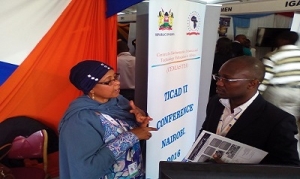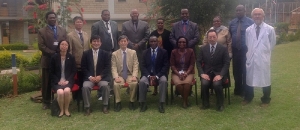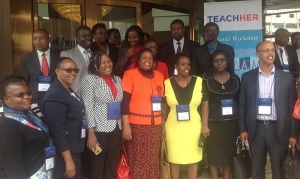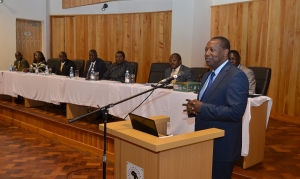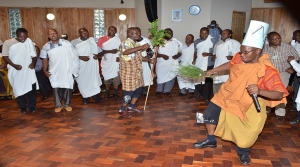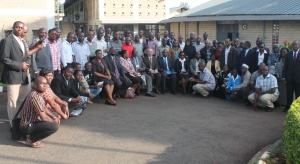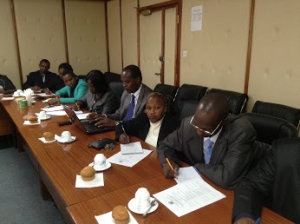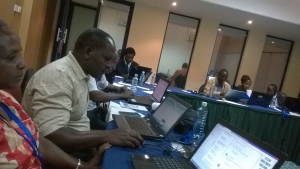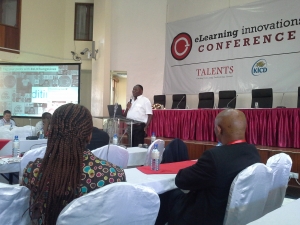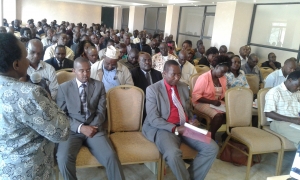The Tokyo International Conference for Africa Development (TICAD VI) was held for the first time outside Japan, with more than 10,000 delegates in attendance. CEMASTEA team participated in the conference as delegates and exhibitors led by Mr. Ngeny Ernest, where we show cased our work and got very positive feedback from delegates who visited our stand.


MR. Ernest K. Ngeny with delegates from the Kenya Police Mr. Mathenge Joseph with delegates in Maasai attire.
The delegates showed interest in the kind of work we do at CEMASTEA wanting to know more of our innovations and great ideas incorporated in our training. As a center of excellence in teacher capacity development in Africa, this conference was aimed towards reaching as many countries as possible through interaction with various people from all over the world. CEMASTEA also got a chance to interact with other exhibitors from different sectors of business thus widening their scope of knowledge.

CEMASTEA Team at TICAD V1Conference 2016
On Monday 29th August, the Japan International Cooperation Agency president, Mr. Shinichi Kitaoka visited CEMASTEA on an official mission. The deputy Director, Mr. Kawa accompanied by other staff welcomed the president to the institution and thereafter held a meeting in the board room.
The meeting began by a welcoming remark from the deputy director and was followed by introduction of all the CEMASTEA staff that were present. A brief presentation on the history and achievements of the institution was then made by Mr. Mathenge before the President was given an opportunity to address the meeting.
This being his fourth visit to Kenya, he mentioned that the main agenda of his visit was to attend the TICAD VI conference that was held at Kenyatta International Convention Centre. In his speech,he stated that the fact that CEMASTEA has become independent, is an achievement to the Japan government. He also assured CEMASTEA staff that the agency shall continue with cooperation to ensure that all the needs of the institution are met.
The visit ended with a tour round the institution to see the facilities that are available as well as assess its standard. The JICA president then planted a tree with the assistance of staff members.


The JICA president being welcomed to CEMASTEA by the Deputy Director Mr.Kawa The JICA president signs the visitor’s book.
A team of Five Lead by Director - Mr. Njoroge Stephen is currently participating in the TEACHHER Regional Workshop as key facilitators in partnership with UNESCO-IICBA, International Institute for Education (IIE) and others. The workshop is inaugural and in attendance are participants from Six African countries namely; Ghana, Nigeria, Ethiopia, Tanzania, Kenya and South Africa.

The STEAM teacher training session has been taking place since 9th August to 2nd September, 2016, featuring some of Africa’s best educators, to see the talent, solutions, and opportunity that exist around Africa used to better Teach STEAM.
The CEMASTEA members include Mrs. Mary W. Sichangi, Mr. Samuel Gachuhi, Mrs. Mary Kariuki and Dr. Tom Mboya.
Date: 25th to 29th April 2016
Venue: NI3C
Theme: Promoting STEM through ICT integration in teaching and learning
Workshop objectives
- Enhance participants skills to seamlessly integrate ICT in teaching and learning
- Enhance participants ability to integrate STEM in teaching and learning
CEMASTEA came alive as more than 200 people from 5 different counties including CEMASTEA staff, gathered to celebrate Culture Night On Thursday 25th February, 2016. The cultural night entailed display of cultural artifacts, cultural dance display, exchange of cultural ideas that is educational, and dinner. Good traditional music attracted crowds to the dance floor until late into the hour. The participants were dressed in traditional attires from different communities with was Kenyan dishes form respective communities with ranging from brown ‘ugali’, ‘samaki’(fish) and many more delicacies.


The Kenya ICT Competency Framework for Teachers (KICT-CFT) is a 15-week long online course designed to train teachers to effectively deploy ICT into their teaching, school administration and lifelong professional learning. The main sponsor is UNESCO, in collaboration with Teachers Service Commission (TSC) and Ministry of Education, Science and Technology (MOEST). In order to be successful in the course the teachers need to be familiar with the tools required to study online using Moodle platform. Therefore a three day face-face workshop was organized from 19th to 21st January at CEMASTEA to start off the course. This was the second cohort of the training; the first cohort completed in August 2015.
Global Partnership in Education (GPE) Primary Education Development (PREIDE) Project (2015-2019) is a MoEST project with two objectives:
- Improve Early Grade Mathematics Competencies among Learners
- Strengthen Management Systems at School and National Levels
Centre for Mathematics Science and Technology Education in Africa (CEMASTEA) will be actively involved and particularly in the Project Development Objective 1: Improve Early Grade Mathematics (EGM) competencies among Learners
This objective will be achieved through Component 1: Improving the foundations of learning by enhancing early grade mathematics under the following sub-components
1.1: Improving teacher competencies for developing EGM numeracy (Class 1 & 2)
1.2: Providing Classroom Instructional Materials
1.3: Enhancing Teacher Pedagogical Supervision
1.4: Mainstreaming EGM Methodologies in Pre-Service Teacher Education
1.5: EGM Management and Coordination
Towards the support of this important project, CEMASTEA has seconded Mr. Joseph Ogwel to work full time and currently he is the Deputy Coordinator leading component 1 of the project where he is making immense contribution to the project as observed by the Project National Coordinator Madam Martha Ekirapa. In addition Messrs. George Kiruja, Joseph Kuria and John Odhiambo have been nominated to the national technical team under the project. The launching and commissioning of the technical team was presided over by the Principal Secretary on 5.11.2015 at the MoEST headquarters.
DATE: 2ND-6TH NOVEMBER 2015
VENUE: MERICA HOTEL, NAKURU
Introduction
CEMASTEA, held ASAL Cluster Trainers’ INSET in 3 PTTCs which are SMASE Regional INSET Centres from 11th to 17th January 2015. These centers include Egoji, Kilimambogo and Shanzu. A total of 100 CTs were trained which was inadequate to reach teachers at the cluster level. Consequently selected 36 County Trainers (PTTC Tutors) were inducted to conduct cluster INSET at selected regional centres in May and June 2015 and 2250 teachers were trained.
Workshop Objective
The objective of the workshop is to finalise the compilation of Cluster Trainers’ INSET and Cluster INSET conducted by National Trainers and County trainers respectively.
Expected outputs
- ASAL Cluster INSET Report
- ASAL Cluster INSET M&E Report
Theme: Changing Lives through eLearning/Mobile Education
The Core Goals for the conference were:
- Enrich how individuals and organizations learn across all platforms and sectors
- Provide a rich networking and collaboration space for like-minded individuals for professional growth
- Encourage innovation, growth of ideas and their publication through this initiative and other publication tools e.g. Slide Share
CEMASTEA had an opportunity to participate in the 3rd Annual elearning Innovations Conference held at KICD from 28th Sept to 2nd October, 2015. The staff had an opportunity to present papers on the following topics:
- Using WhatsApp in enhancing pedagogical competencies: the lesson study model by Waibochi Paul and Mrs. Nyambura Esther
- Improving teaching and learning through teacher developed digital content (TDDC) that link schools and the world of work by Mrs. Njeri Mburu and Mr. Kuria Joseph
There were other presentations from various organizations and presenters under the following topic:
Changing Lives: - Mobile Education & Tools Across the sectors
- Mobile Education making Waves Across the sectors
- For disadvantaged audience
- Teaching Professions
There were great Innovations like kytabu application, Melimu, Learning Managemnt System (LMS) and so on. eLearning/Mobile education is being adopted by various institutes, companies and individual which is a great way to innovate our process and make learning easy and fun.
A brief on CEMASTEA 2015 Stakeholders’ Workshop
Introduction
CEMASTEA is mandated to offer In-service Education and Training (INSET) in Education for teachers at both primary and secondary level. In addition, sensitisation workshops are conducted for other stake holders to support INSET activities. In the 2015/2016 FY, the sensitization workshops will be conducted in two 2 cohorts. Cohort 1 will be composed of 216 stakeholders namely: INSET Centre Principals’ Representatives (8), KESSHA Regional Representatives, Sub- County Directors of Education (47), Sub county QASOs (47), County Trainers Representatives (47), TSC Sub-County Directors (47), TAC Tutors Representatives (12) while Cohort 2 will be composed of 166 stakeholders namely: MoEST Headquarters (6), TSC, Director Teacher Management (1), KICD Director (1), KNEC Secretary (1), KNUT Secretary (1), KESSHA National Chairman (1), KEPSHA National Chairman (1), CDEs (47), TSC CD (47), CQASOs (47) and KTCPA (3).
The theme of the workshops is to enhance the quality of SMASE Programmes management at the County and Sub-County levels.
Objectives
By the end of the workshop participants will be able to:
- Share experiences on management of SMASE Programmes at county and sub-county levels
- Establish mechanisms for sustainable management of SMASE programmes
- Develop a clear understanding of the funding, budgeting and accounting for SMASE funds
- Appreciate your role in the implementation of INSET activities and school-based teacher capacity development programmes
Expected Outcome
It is expected that the workshop will produce workable guidelines on effective management of SMASE Programmes at both Secondary and Primary education levels.
Duration and Venue
The workshops will be held for 2 days each in 2 cohorts at Gelian Hotel- Machakos
Workshop dates
The proposed dates for the workshop are
Cohort 1: 1st – 2nd October 2015 & Cohort 2: 6th – 7th October 2015

